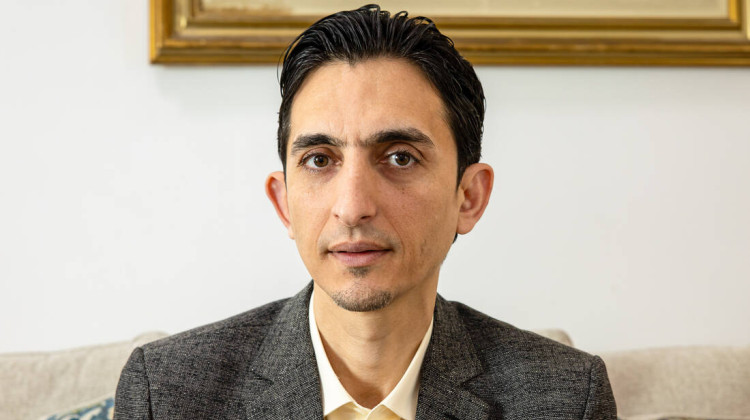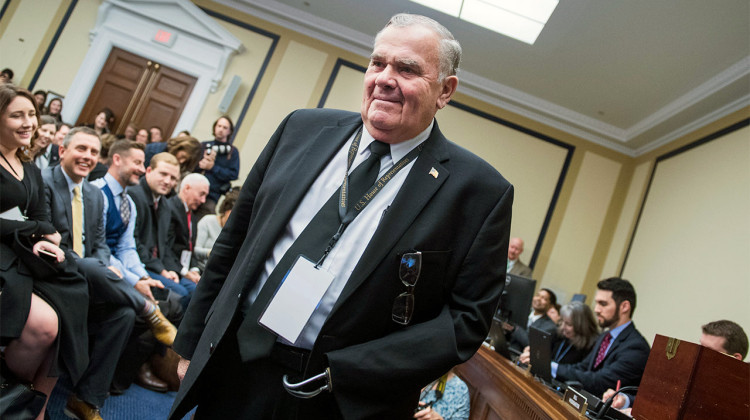
Husam Abukhedeir, a Palestinian neurosurgeon, left his native Gaza for the United Arab Emirates last November because he felt that conditions caused by the war had stripped him of his power as a physician — and endangered his family. Nearly 9 months have passed, and Abukhedeir does not see an end in sight to the suffering
Christopher Pike for NPR / Christopher Pike for NPR
In February, NPR published the story of Husam Abukhedeir, the Palestinian chief neurosurgeon at Al-Shifa Hospital in Gaza. When war broke out after the October 7 Hamas-led attack on Israel, he spent nearly two months tending to severely injured Palestinians, rationing care – in effect choosing who lives and who is left to die amid a shortage of medical supplies and fuel.
His wife and five young children, including a then 6-month-old baby, moved into a single room at the hospital with him after they felt their home became unsafe due to Israeli airstrikes.
When Israeli forces encircled Al-Shifa, Abukhedeir believed that his family was in danger and recognized that he was unable to serve his patients due to the lack of medical resources. So, he made the difficult decision to leave his homeland with his young family – taking advantage of their foreign passports to depart.
NPR caught up with Abukhedeir to check on how he’s been doing since he left the enclave for Egypt, and then the United Arab Emirates.
Last time NPR spoke to Abukhedeir, it had been just a month since he left Gaza. The physical exhaustion and the emotional wounds of the death and injuries he had to deal with as the chief neurosurgeon of the enclave’s largest medical complex were still fresh. But he still had passion –– and hope –– in his voice.
But now, he says, he’s “alive but he’s not living.”
Nearly 9 months have passed and Abukhedeir does not see an end in sight to the suffering. This has dampened his spirit, he says. He still believes that he will one day be back to rebuild and serve his community. But, as he puts it, it will take “nothing short of a miracle”. And he doesn’t know how many of his family members in Gaza will still be alive.
“All we have left is to pray to God that this suffering stops,” he said.
And when the phone rings, he fears it will be bad news about his elderly parents or one of his siblings who are still alive in Gaza.
“I want to check on my family but when they’re the ones who call me, I worry that they will tell me someone has died,” he says.
Since Abukhedeir left Gaza, he sometimes feels remorse and guilt that he left his family and patients behind.
“But I thank God when I remember that exiting Gaza was God’s plan for me,” he says. “It saved me from this genocide and meant that I’m still able to help my family and patients even though I’m abroad through remote medical consultations and financial support.” (The Israeli government has strongly denied accusations that it has violated the convention against genocide.)
Even though he previously held a medical license to practice in the UAE, it took four months of waiting and paperwork for Abukhedeir to get permission to practice at a private medical center in the city of Al-Ain.
“Life here is very expensive. There are many expenses for schools. Housing is costly,” he says. “We had to burn through all of our savings.”
Their new life holds promise: as in Gaza, the main language is Arabic, there are nice places for his kids to go to and some restaurants that serve familiar Middle Eastern food. But he does not have the appetite for any of it.
“My wife and I go out only to create a nice environment for our kids,” he says.
Abukhedeir has already lost many things he held dear in Gaza: his house, his clinic and dozens of friends, colleagues and family. The closest death was his sister, Dalia, who, he says, perished from untreated burns that covered three-quarters of her body in October after an Israeli airstrike. Abukhedeir’s 22-year-old nephew, Dalia’s son, was also severely burnt but is still living with the wounds. Abukhedeir has been trying to get him out of Gaza to seek urgent medical treatment to no avail.
He lost his right ear, can’t properly use his legs because he needs physiotherapy and can’t move his hands due to contractures, a complication where burn scars mature, tighten and thicken, preventing movement of the affected area, Abukhedeir says. The situation weighs heavily on him.
“He was one of the most diligent young men in the family. He was a third year computer science student in college. He loved his work and was full of passion and energy,” Abukhedeir says. “All of that is gone. He can’t use his hands to work on computers. And it pains me that I can’t do anything about it.”
Abukhedeir’s elderly parents are also still in the North of Gaza and he hasn’t been able to get them out. They have been living on canned foods for months, with no fresh produce available, he says.
“They haven’t seen meat or chicken or fresh fruits or vegetables for so long,” he says.
Starting from ground zero
Before the war, Abukhedeir and his family lived a comfortable life in Gaza. He was at the top of his career ladder as a neurosurgeon with a bustling clinical practice and around 14 neurosurgery trainees to mentor at Al-Shifa Hospital and the European Hospital in southern Gaza.

At his new job in the UAE, he has had to start from ground zero. He needs to establish a name for himself and build a referral system for patients to come.
He’s putting in the work for his family’s sake. But it’s not easy.
He says that a sense of anguish is consuming both him and his wife.
He won’t let his children watch the news lest the harrowing images affect them, but when they’re not around, he and his wife tune in. “It’s unbearable. But we really can’t turn away from it,” he says.
The children are resilient but they are still healing. They seem shaken everytime they remember what they endured in Gaza, Abukhedeir says. He adds that they thank God they’re safe but feel sad and worried about the family still there.
The kids have just started to get acclimated to their new school, make friends and live a semblance of a normal life.
“Even though my wife and I are shells of humans at this point, we smile and want our children to live a life like any child deserves,” he says.
In terms of mid- or long-term plans, Abukhedeir said he is taking it one day at a time.
“I feel like I’m paralyzed,” he says. “I just can’t think or make any plans until the war ends.”
Farah Yousry is the managing editor of Side Effects Public Media, a health reporting collaboration of NPR member stations across the Midwest, based at WFYI in Indianapolis. Previously, she reported for BBC News' Arabic radio and television covering a wide array of stories from the U.S. She has also worked as a journalist in Egypt, where she covered the Arab Spring.
 DONATE
DONATE






 Support WFYI. We can't do it without you.
Support WFYI. We can't do it without you.